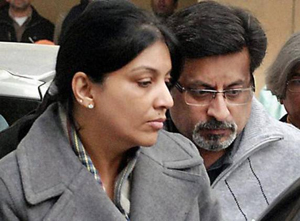 New Delhi, Nov 25: A special CBI court on Monday convicted dentist Rajesh Tawlar and his wife Nupur Talwar of killing their daughter Aarushi and servant Hemraj.
New Delhi, Nov 25: A special CBI court on Monday convicted dentist Rajesh Tawlar and his wife Nupur Talwar of killing their daughter Aarushi and servant Hemraj.
The couple have been taken into custody.
The verdict comes almost five-and-a-half years after the country's most sensational double murder occurred.
The CBI had accused the parents — Rajesh and Nupur Talwar — of being the killers, going by circumstantial evidence, testimony of witnesses and forensic reports.
The Talwars had all along claimed that "they have been framed" on the basis of conjectures and tutored witnesses.
When the Noida police first came to know on May 16, 2008 that the 14-year-old daughter of prominent dentist Dr Rajesh Talwar had been murdered at their residence in Jalvayu Vihar allegedly by their servant, Hemraj Banjade, it appeared as a regular murder case.
But things changed dramatically the very next day when Hemraj's body was found on the terrace of the house. The Noida police and two CBI teams investigated the case, which saw many twists and turns.
From Dr Rajesh and Nupur Talwar going to jail and allegations of tampering of evidence to witnesses turning hostile, police officers getting shifted, closure report being filed, parents coming out on bail and then a trial - the case has kept both the media and people transfixed.
The latest trial got over on November 12 after almost 19 months during which CBI used testimony of close to 90 witnesses in order to prove that it was only the parents who could have committed the murders and there was no possibility of an outsider entering the house.
The motive: Dr Talwar found his daughter in an objectionable state with Hemraj after which he killed them with a golf club and slit their throats using a surgical scalpel or knife. CBI's investigating officer A G L Kaul stated that he wanted to make Dr Rajesh Talwar's brother, Dinesh Talwar, a suspect as well.
During cross-examination and their final arguments, the counsel for Talwars - Satyaketu Singh and Tanveer Ahmed Mir - slammed every aspect of CBI's investigations. They alleged that its important witnesses like Dr Sunil Dohre, Naresh Raj and M S Dahiya had improved their statements while many witnesses like maid Bharti and CDFD (Centre for DNA Fingerprinting and Diagnostics) experts had been tutored by the agency. Talwars' lawyers alleged that CBI had tampered with, fabricated and changed the evidence to frame the parents and that its case against them was full of "alternate hypothesis" and had no merit.
The case had been first investigated by the Noida police and Dr Rajesh Talwar had been arrested. Then IG Gurdarshan Singh had addressed a press conference where he announced the honour killing theory leading to severe criticism and his eventual transfer. The police were blamed for not properly pre-serving the crime scene and going easy on the probe. The then chief minister, Mayawati, transferred the probe to CBI.
The first twist came when CBI, led by then joint director, Arun Kumar, arrested three servants - Krishna Krishna, Rajkumar and Vijay Mandal - and called a press conference to claim that they were the killers and that there was "scientific evidence" against them. Dr Talwar was given a clean chit. The agency had at that time conducted several tests, including lie-detection, psychoanalysis and narco analysis, on the servants. However, Kumar's team later did not file a chargesheet, saying "they did not have enough evidence against the servants" and they were released on bail.
In September 2009, after reports of Aarushi's vaginal swabs being changed and pathology reports going missing emerged, the then CBI director, Ashwini Kumar, changed the investigation team. The new team was headed by joint director Javed Ahmad (in Lucknow) and SSP Neelabh Kishore. Additional SP AGL Kaul, investigating officer of the case, re-investigated the matter by re-examining the scene of crime, going through the case dairies, checking hospital records and conducting narco tests on Talwars in February 2010. The trail led them back to Dr Talwar.
Though Kaul wanted to file a chargesheet against the parents, his seniors suggested a closure report. This report was filed on December 29, 2010, with evidence against Dr Rajesh Talwar and Nupur Talwar, along with statements of 84 witnesses, documents and forensic reports.
In a dramatic turn, however, the special CBI judge rejected the closure re-port and summoned both parents as accused for murder and destruction of evidence on the basis of statements and circumstantial evidence cited by CBI. After then for over a year, the Talwars filed many applications in lower courts, Allahabad high court and Supreme Court, seeking relief against the charges and rebutting the charges. However, Supreme Court asked them to join the trial as soon as possible.
The CBI, meanwhile, filed many applications in court seeking to send Nupur Talwar to judicial custody since she had been summoned as an accused. She was sent to Dasna Jail on April 30, 2012, until Supreme Court gave her bail on September 17 that year.
During the past 19 months of trial, the dentist couple has maintained that they have not killed their daughter and servant and that the CBI's conclusions were based on "presumptions, conjectures and surmises" and "not substantiated or supported by true and actual facts". The Talwars have claimed that the CBI's charges against them show "deliberate lapses" in investigations besides "noticeable non-mentioning of material pieces of evidence". They have called the probe as "tainted and tailored".





Comments
Add new comment